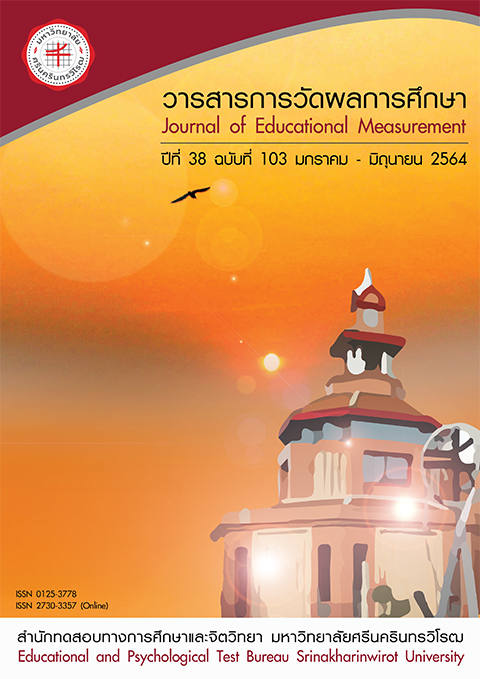การรับมือทางด้านจิตใจกับการเว้นระยะห่างทางสังคมในช่วงการระบาดของโควิด-19: คำบอกเล่าของผู้หญิงบนอินสตาแกรม
คำสำคัญ:
coping, social distancing, COVID-19, Instagram, reflexive thematic analysisบทคัดย่อ
การระบาดของโควิด-19 ซึ่งส่งผลให้มีความจำเป็นต้องใช้มาตราการเว้นระยะห่างทางสังคมได้กลายมาเป็นความท้าทายทางจิตใจสำหรับผู้คนทั่วโลก ในช่วงเวลาแห่งวิกฤตนี้ มีการรายงานว่าผู้หญิงเผชิญกับผลกระทบทางลบ ด้านจิตใจมากกว่าผู้ชาย งานวิจัยนี้มีจุดมุ่งหมายเพื่อศึกษาว่าผู้หญิงนำเสนอวิธีการรับมือกับการเว้นระยะห่างทางสังคมบนอินสตาแกรมอย่างไร ข้อมูลวิจัยถูกเก็บรวบรวมมาจาก 320 โพสต์ในอินสตาแกรมที่มีรูปภาพและข้อความบรรยายเกี่ยวกับการรับมือกับการรักษาระยะห่างทางสังคมของผู้หญิงซึ่งถูกโพสต์ระหว่างเดือนมีนาคมถึงเดือนสิงหาคม 2563 ข้อมูลวิจัยถูกนำมาวิเคราะห์เชิงคุณภาพโดยใช้การวิเคราะห์แก่นสาระเชิงสะท้อน ผลการวิจัยแสดงให้เห็นถึงความพยายามของผู้หญิงในการลดอารมณ์ทางลบและคงไว้ซึ่งอารมณ์ทางบวกในช่วงเวลาของการเว้นระยะห่างทางสังคม ไม่ว่าจะเป็นการแสวงหาปฏิสัมพันธ์เชิงสังคม การใช้เวลาคุณภาพกับคนสำคัญ การเชื่อมโยงกับธรรมชาติ การหากิจกรรมที่เพลิดเพลินภายในบ้านและการกำกับอารมณ์ ผลการวิจัยเสนอแนะว่าวิธีการบำบัดทางจิตใจที่มุ่งเน้นความงอกงามผ่านความทุกข์อาจมีศักยภาพในการช่วยส่งเสริม
สุขภาวะทางจิตและการรับมือทางจิตใจที่เหมาะสมในห้วงเวลาแห่งความกังวลและโดดเดี่ยวดังเช่นในช่วงของโรคระบาดนี้
เอกสารอ้างอิง
August, R., & Dapkewicz, A. (2020). Benefit finding in the COVID-19 pandemic: College students’ positive coping strategies. Journal of Positive School Psychology. 1-14.
Banerjee, D., & Rai, M. (2020). Social isolation in Covid-19: the impact of loneliness. Int. J. Soc. Psychiatry. 66. 525–527.
Braun, V., & Clarke, V. (2013). Successful qualitative research: A practical guide for beginners. London: Sage
Braun, V., & Clarke, V. (2019). Reflecting on reflexive thematic analysis. Qualitative Research in Sport, Exercise and Health. 11 (4). 589-597.
Burr, V. (2015). Social constructionism (3rd nd.). Hove: Routledge.
Capaldi, C. A., Passmore, H. A., Nisbet, E. K., Zelenski, J. M., & Dopko, R. L. (2015). Flourishing in nature: A review of the benefits of connecting with nature and its application as a wellbeing intervention. International Journal of Wellbeing. 5 (4). 1-16.
Chen, E., Lerman, K., & Ferrara, E. (2020). Tracking social media discourse about the covid-19 pandemic: Development of a public coronavirus twitter data set. JMIR Public Health and Surveillance. 6 (2). e19273.
Eisenbeck, N., Pérez-Escobar, J. A., & Carreno, D. F. (2021). Meaning-Centered Coping in the Era of COVID-19: Direct and Moderating Effects on Depression, Anxiety, and Stress. Frontiers in Psychology. 12. 667.
Evans, S., Mikocka-Walus, A., Klas, A., Olive, L., Sciberras, E., Karantzas, G., & Westrupp, E. M. (2020). From ‘It has stopped our lives’ to ‘Spending more time together has strengthened bonds': The varied experiences of Australian families during COVID-19. Frontiers in psychology. 11. 2906.
Folkman, S. (1997). Positive psychological states and coping with severe stress. Social Science and Medicine. 45 (8). 1207–1221.
Folkman, S. (2008). The case for positive emotions in the stress process. Anxiety, Stress, and Coping. 21 (1). 3-14.
Folkman, S., & Moskowitz, J. T. (2007). Positive affect and meaning-focused coping during significant psychological stress. In M. Hewstone, H. A. W. Schut, J. B. F. De Wit, K. Van Den Bos, & M. S. Stroebe (Eds.). The Scope of Social Psychology: Theory and Applications (p. 193–208). Psychology Press.
Frydenberg, E. (2014). Coping research: Historical background, links with emotion, and new research directions on adaptive processes. Australian Journal of Psychology. 66 (2). 82-92.
Fullana, M. A., Hidalgo-Mazzei, D., Vieta, E., & Radua, J. (2020). Coping behaviors associated with decreased anxiety and depressive symptoms during the COVID-19 pandemic and lockdown. Journal of Affective Disorders. 275. 80-81.
Gurvich, C., Thomas, N., Thomas, E. H., Hudaib, A. R., Sood, L., Fabiatos, K., ... & Kulkarni, J. (2020). Coping styles and mental health in response to societal changes during the COVID-19 pandemic. International Journal of Social Psychiatry. 0020764020961790. 1-10.
Janoff-Bulman, R., & Berger, A. R. (2000). The other side of trauma: Towards a psychology of appreciation. In J. H. Harvey & E. D. Miller (Eds.). Loss and trauma: General and close relationship perspectives (p. 29–44). Brunner-Routledge.
Kimbrough, A. M., Guadagno, R. E., Muscanell, N. L., & Dill, J. (2013). Gender differences in mediated communication: Women connect more than do men. Computers in Human Behavior. 29 (3). 896-900.
Lazarus, R. S., & Folkman, S. (1984). Stress, appraisal, and coping. New York: Springer publishing company.
Masten, A. S. (2015). Ordinary magic: Resilience in development. Guilford Publications.
McKenna, B., Myers, M. D., & Newman, M. (2017). Social media in qualitative research: Challenges and recommendations. Information and Organization. 27(2). 87-99.
Morison, T., Gibson, A. F., Wigginton, B., & Crabb, S. (2015). Online research methods in psychology: Methodological opportunities for critical qualitative research. Qualitative Research in Psychology. 12 (3). 223-232.
Prowse, R., Sherratt, F., Abizaid, A., Gabrys, R. L., Hellemans, K. G., Patterson, Z. R., & McQuaid, R. J. (2021). Coping With the COVID-19 Pandemic: Examining Gender Differences in Stress and Mental Health Among University Students. Frontiers in Psychiatry. 12. 439.
Rossi, R., Socci, V., Talevi, D., Mensi, S., Niolu, C., Pacitti, F., ... & Di Lorenzo, G. (2020). COVID-19 pandemic and lockdown measures impact on mental health among the general population in Italy. Frontiers in psychiatry. 11. 790.
Roubinov, D. S., Turner, A. P., & Williams, R. M. (2015). Coping among individuals with multiple sclerosis: Evaluating a goodness-of-fit model. Rehabilitation psychology. 60 (2). 162-168.
Salfi, F., Lauriola, M., Amicucci, G., Corigliano, D., Viselli, L., Tempesta, D., & Ferrara, M. (2020). Gender-related time course of sleep disturbances and psychological symptoms during the COVID-19 lockdown: A longitudinal study on the Italian population. Neurobiology of Stress, 13, 100259.
Sedikides, C., Wildschut, T., Arndt, J., & Routledge, C. (2008). Nostalgia: Past, present, and future. Current Directions in Psychological Science. 17 (5). 304-307.
Serafini, G., Parmigiani, B., Amerio, A., Aguglia, A., Sher, L., & Amore, M. (2020). The psychological impact of COVID-19 on the mental health in the general population. QJM: An International Journal of Medicine. 113 (8). 531-537.
Stodolska, M. (2020). #QuarantineChallenge2k20: Leisure in the time of the pandemic. Leisure Sciences, 1-8.
Taylor, S. E., Klein, L. C., Lewis, B. P., Gruenewald, T. L., Gurung, R. A., & Updegraff, J. A. (2000). Biobehavioral responses to stress in females: tend-and-befriend, not fight-or-flight. Psychological review. 107 (3). 411-429.
Walsh, F. (2020). Loss and resilience in the time of COVID‐19: Meaning making, hope, and transcendence. Family process. 59 (3). 898-911.
Wong, P. T. (2020). Existential positive psychology and integrative meaning therapy. International Review of Psychiatry. 32 (7-8). 565-578.



